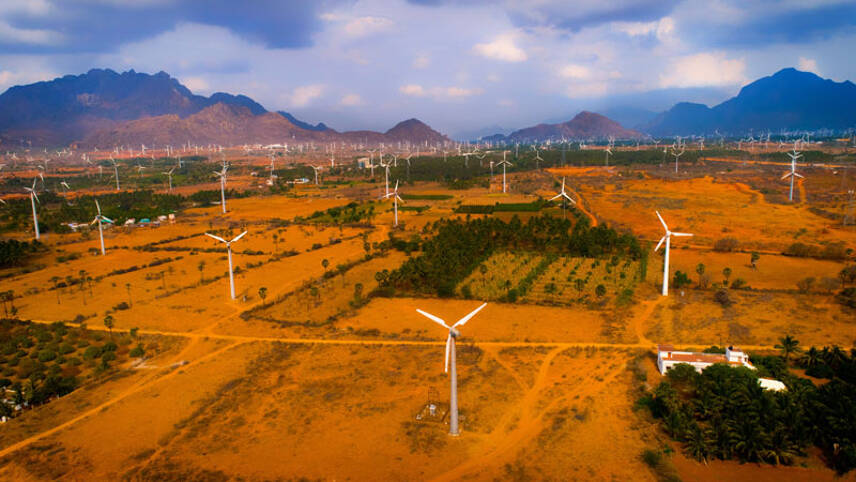This premium content is exclusive to edie Members.
To find out more about edie Membership, please click below.
If you are an existing member, login here

Pictured: Muppandal Wind Farm, India
These figures are headline takeaways from the professional services giant’s new report on financing the green energy transition. Released on Tuesday (28 November), the report assesses the current and likely future funding gap, as well as providing solutions that could reduce the cost of the transition.
On the funding gap, the report warns that up to £5.6trn is needed each year through 2050 on a global basis, up from £1.6bn at present.
But around a quarter of the cumulative costs, equal to around £40trn, could be avoided if concerted action is taken to unlock finance at scale in short and medium term.
Moreover, these costs would be far below those that would result from a global failure to limit the temperature increase on pre-industrial levels below 3C.
Deloitte found that renewable energy and alternative fuel projects tend to suffer from underinvestment and high required return rates because private investors believe they can be risky.
This is the case for emerging technologies, like carbon capture and hydrogen, in many markets including wealthy nations. Here, there is a role for governments de-risk investments, through interventions such as blended finance mechanisms or auction schemes.
And, in emerging and developing economies, investors see enhanced risk even in mature technologies like wind and solar farms. Deloitte found that less than half of the investments it tracked were made in these economies last year when the share will need to be 70% by 2030 to ensure that these nations do not rely on fossil fuels for economic development.
This under-funding of clean energy in the Global South has already been repeatedly highlighted by the International Energy Agency (IEA).
Deloitt’s global sustainability leader for the financial services industry, Hans-Juergen Walter, said: “To further lighten the financial burden on the Global South, governments, financial institutions, and international organizations must implement concessional finance—a loan made on more favorable terms than the borrower could obtain in the market—through innovative financing structures that mobilize private capital for climate action.
“Major financial institutions, such as development banks and multilateral funds, play a pivotal role in this context.”
Most finance made for climate action in emerging and developing nations to date has been in the form of loans. Being locked into unfavorable payback terms has only worsened the economic state of some nations.
Last winter at COP27, Barbados’s Prime Minister Mia Mottley kick-started a programme of work to reform how multilateral development banks provide finance for the low-carbon transition and climate adaptation.
Net-Zero Industry Tracker
Deloitte’s report covers the energy needed to decarbonise electricity, building heating, transport and also industrial processes.
On the latter, the World Economic Forum (WEF) has called for “dramatic” action to scale investment to close an “emissions canyon” in eight hard-to-abate sectors including steel, cement, aluminium and shipping. Emissions from these sectors have grown by 8% in the past three years alone and future increases could jeaprodise the delivery of the Paris Agreement.
The WEF’s new Net-Zero Industry Tracker concludes that $13.5trn (£10.6trn) of investment is needed in these industries through to 2050, largely to support technologies that are not yet commercially mature and are not likely to be available at scale until at least 2030.
Investments need to be made now in R&D for things like clean hydrogen, alternative fuels and electrifying processes. There is also much opportunity for investment in energy efficiency.
According to the report, carbon pricing, tax subsidies, public procurement and development of strong business cases can help to unlock finance for existing technologies.
As was the case with Deloitte’s report, the WEF acknowledges that some wealthy economies such as the US and EU are enacting large-scale policy measures to bring down cleantech costs and address other practical barriers. But it warns that emerging economies will need support to follow suit, especially as they are set to account for a larger share of future energy demand for industrial processes.
Another warning surrounds emerging technologies. The WEF states that it could be challenging in the macroeconomic climate to raise capital for unproven solutions. Institutional investors, multilateral development banks and governments are called upon to help reduce risk.


Please login or Register to leave a comment.